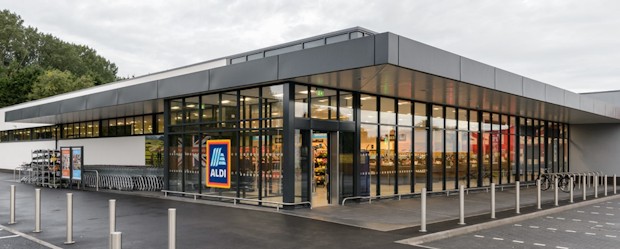Aldi is planning to invest a record £1.6bn in the UK over the next two years (2026-27), opening 80 new stores as part of its drive to reach its long-term target of 1,500 sites. The pledge came as the discounter revealed that its profits tumbled 21.2% last year due to investment in infrastructure, keeping prices low, and raising staff pay.
 Over the 12 months to 31 December 2024, sales for Aldi UK & Ireland increased only 3.4% to £18.1bn. However, the company noted that its sales had accelerated in 2025 with growth of 4.8%, taking its market share to 10.8% (Kantar Worldpanel). It also pointed to reports earlier this year that it had overtaken Asda to become the UK’s third largest grocer by value of food and drink sales.
Over the 12 months to 31 December 2024, sales for Aldi UK & Ireland increased only 3.4% to £18.1bn. However, the company noted that its sales had accelerated in 2025 with growth of 4.8%, taking its market share to 10.8% (Kantar Worldpanel). It also pointed to reports earlier this year that it had overtaken Asda to become the UK’s third largest grocer by value of food and drink sales.
However, higher costs contributed to its operating profit falling from £435.5m to £552.9m, representing a margin of 2.4%.
The discounter stated it was “more determined than ever” to meet the UK’s growing demand for affordable groceries as more families struggle with their household budgets. However, it warned that any measures in the upcoming Budget that further increase costs on employers could lead to further hikes in food prices.
Giles Hurley, Chief Executive for Aldi UK & Ireland, noted that the impact of last year’s National Insurance rise and the cost of new packaging rules had already “rippled through to prices on the shelf edge”.
Speaking to the BBC, he added: “Any policies which affect the operating costs of business should be considered very, very carefully because of the very real risk they find their way… back into the food system and onto prices.”
Hurley highlighted that Aldi had invested more than £300 million in efforts to offset the rising cost of goods and keep prices as low as possible.
Even so, supermarket prices for many staple products have rocketed this year, including items such as lean beef mince, which has gone from £3.79 at several large supermarkets at the start of the year to more than £5 at most chains now. “Cattle prices are up 30% this year and herd sizes are dropping, and that is playing into the price of mince,” the Aldi chief told the BBC.
He noted that global factors have had a major impact on food inflation everywhere, including rising commodity prices. But Hurley also said some domestic policy decisions have “perhaps inadvertently” created a more stubborn inflation situation in the UK, “probably more so than in other developed countries”.
He suggested that more certainty and support for farmers was necessary to boost the amount of food produced in the UK, which could have a “really positive impact” on inflation. “Ultimately, a resilient British food sector is utterly dependent on having a resilient British farm sector,” he said.
Aldi currently has 1,060 stores in the UK and is set to open a total of 21 new stores in the next 13 weeks in areas such as Shoreditch in London, Durham in the North East, and Kirkintilloch in Scotland.
“Since we opened our first UK store over 35 years ago, we’ve brought high-quality, affordable groceries to almost 800 towns and cities, but there are hundreds more communities that don’t have an Aldi nearby,” said Hurley.
“We’re more determined than ever to meet that demand, and that’s why we’re investing a record £1.6bn over the next two years, to bring Aldi prices closer to millions more customers.”
NAM Implications:
- Aldi is on a roll…
- …and patently wanting to maintain momentum.
- (incidentally adding its voice to rivals’ warning government re Autumn Tax rises)
- Retail is a narrow-margin business, so any cost increases can impact shelf prices.
- One issue that will affect Aldi (and Lidl) is the impact of a low proportion of brands in their assortments…
- While this may help them optimise the nation switching from brands to own label/surrogate labels…
- ….this brand/surrogate label balance may disadvantage the discounters as Retail Media grows as an incremental revenue stream.




